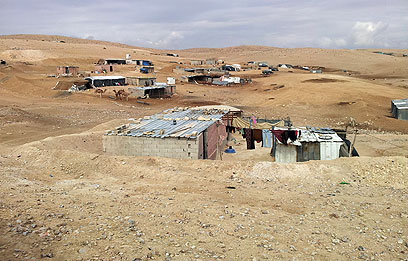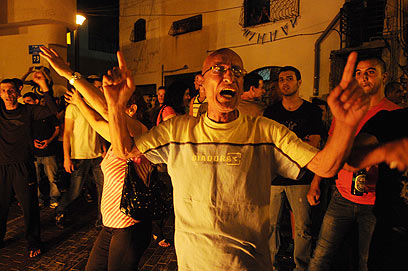
Amnesty International: Israel violates human rights
Rights group accuses Israel of torture, restricting movement, limiting freedom of speech, and a 'siege that strangles 1.6 million people.' According to the group, torture and abuse are also rampant in both the PA and Hamas governments
Amnesty International published on Thursday its human rights report for 2012, which provides a survey of the global human rights situation. The report addresses human rights in 155 nations over the course of 2011 and offers a macroview of international human rights violations.
The report, highlights of which were presented before journalists at Beit Sokolov on Wednesday evening, notes that as Amnesty International enters its sixth decade of work, the findings demonstrated not only the suffering of those living in the shadow of human rights violations, but also those who are inspired to work for human dignity.
Related stories:
- 'Investigate MKs for incitement'
- Border Guards to be deployed in south TA?
- Op-ed: The peace camp charade
- Op-ed: What about UN crimes?
An introduction penned by Amnesty International Israel Chairman Dr. Yishai Menuhin and general director of the group in Israel Yonatan Ger says that 2011 was not free from widespread human rights violations, but that looking back it was possible to say that human rights had never been so central a subject as they were last year. "If in the past tyranny was part of the reality of life in many countries, last year we witnessed unprecedented civil revolts in which citizens told their leaders: enough."
Addressing the group's activity in Israel, Menuhin and Ger said that AI continues to protect the rights of refugees and asylum seekers, fight ongoing housing discrimination against Palestinians, and prevent human rights violations stemming from the Israeli "occupation."
The report addressed Israel's ongoing closure on the Gaza Strip, saying that the situation, in existence since 2007, had created a humanitarian crisis for 1.6 million residents, most of whom were dependent on humanitarian aid. The report criticized the ongoing ban on exports, which it said "choked" the economy, as well as the severe restrictions on imports. According to AI, this has driven prices up, in effect a collective punishment, which contravenes international law and is particularly hard on children and the sick.

The Bedouin village of Dakika - in danger of demolition (Photo: Elior Levy)
At least 36 Palestinians have been killed in accidents in smuggling tunnels or in Israeli Air Force attacks on the tunnels, Amnesty says. In addition the report addressed the several aid flotillas to Gaza stopped by the Israeli government. The organization noted that while in September 2011 the UN had decreed Israel's naval siege on Gaza legal, it had not addressed the legality of the overall closure of the Gaza Strip.
Turning to the West Bank, the Amnesty Report noted that "over 500 checkpoints and military barriers continued to complicate Palestinians' access to employment, schools, and hospitals, while Israel continued to build a 700-kilometer security fence. The fence, according to the report, is built mainly on Palestinian land and separates "thousands" of farmers from their land and water sources.

Nakba Day riots at the Kalandia checkpoint (Photo: Gil Yohanan)
"Palestinians are forbidden to enter areas surrounding Israeli settlements, which were built and expanded in violation of international law," the report states, adding that settlement construction was up. Amnesty puts the number of settlers living in the West Bank at the end of 2011 at over 500,000.
Moreover, the report continued, in 2011 over 620 Palestinian buildings in the West Bank had been demolished, causing 1,100 Palestinians to lose their homes, 80% more than in 2012. The group noted that Bedouin and other shepherds had been particularly affected and some were in danger of permanent dislocation due to restrictions on their movement.
Amnesty said that Israel's demolition last June of 33 structures in Al-Hadidiya in the northern Jordan Valley had left several families without homes.

A demonstration against migrants in south Tel Aviv (Photo: Yaron Brenner)
The IDF also came in for criticism, with the report citing "unnecessary violence" by troops against Palestinians in the West Bank and against demonstrators on the Lebanese and Syrian borders. Amnesty says that IDF forces killed 55 Palestinian civilians in the West Bank, including 11 children. While the army had set up investigative committees to look into some of these incidents, the report says, the panels were not transparent or independent.
The report also criticized Israel for not taking steps to investigate "war crimes" or "crimes against humanity" committed by Israel during Operation Cast Lead in 2008-9, and said that according to the Yesh Din organization nearly 90% of the police cases in which settlers were accused of violence against Palestinians were closed, and that only 3.5% of the Palestinian complaints about violence by IDF soldiers had led to indictments.
In addition, the Amnesty report claims, in 2011 at least 307 Palestinians from the West Bank had been held in custody in Israel without being indicted or tried. This was possible through the use of directives based on secret information.
Israel also continued its policy of not allowing family members of Gazan Palestinians to visit their relatives being held in Israel prisons, the report says, a policy that has been in place since June 2007. In some cases, according to Amnesty, the government also prevented family members of West Bank residents from visiting them in prison. Amnesty also cited a number of incidents of alleged torture and abuse.
Recent legislation was also cited in the report, with Amnesty arguing that the Knesset had passed laws limiting freedom of speech and assembly, including a law that criminalized calls to boycott Israelis or Israeli institutions or settlements. Amnesty also vilified the Nakba Law, which makes it illegal for Israeli institutions or local authorities to commemorate the Palestinian "Nakba."
Finally, Amnesty addressed the issue of refugees and asylum seekers, saying that Israeli authorities continued to keep Eritrean and Sudanese asylum seekers from undergoing procedures that would declare them refugees. According to Amnesty, migrants from these two countries comprise 80% of the total 45,000 refugee seekers in Israel. Amnesty said that they had been issued temporary documents only and were not eligible to work or apply for public services.
Not only Israel was criticized in the Amnesty report. The Palestinian Authority in the West Bank and the Hamas government in Gaza are guilty of condoning torture and violating civil rights, the group charges.
According to Amnesty, Palestinian security forces torture prisoners and abuse them freely with no ramifications for the perpetrators. Torture methods include beatings, suspension by the wrists or ankles, and forcing victims to stand or sit in painful positions. Amnesty says that four people in Gaza have died in "suspicious circumstances."
Morever, in both Gaza and the West Bank civilians continue to be tried in Palestinian military courts, which are not independent. Hamas reportedly staffs these courts with judges and prosecutors without the appropriate education rather than judges appointed by the Palestinian Authority.
Amnesty adds that hundreds of Palestinians in the West Bank have been jailed without trial for supporting Hamas, while Hamas forces in Gaza have arrested hundreds of Fatah supporters, most of whom were held without being allowed legal counsel, and some of whom were abused.
The Amnesty report also says that both the PA and Hamas government continue to quash freedom of speech, association, and assembly. Journalists are subject to harassment and even trial, as are bloggers and other critics. Islamic organizations are forbidden from holding meetings or demonstrations, and women and girls are subjected to discrimination and violence by family members.
(Elior Levy contributed to this report)










